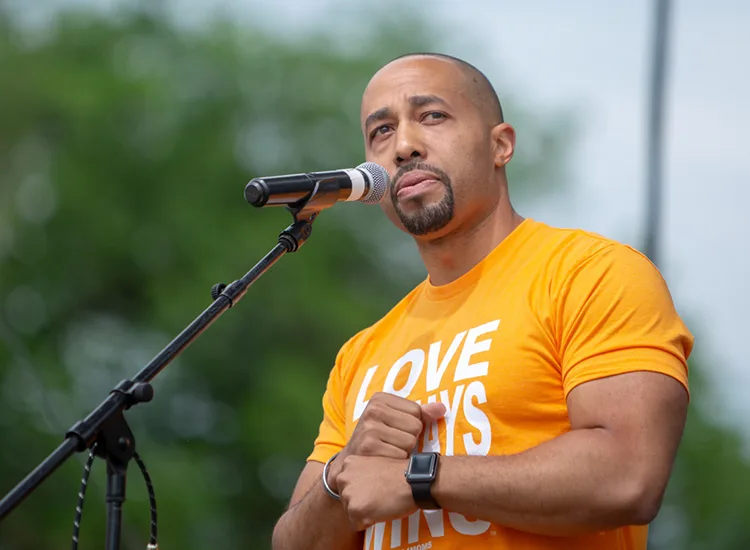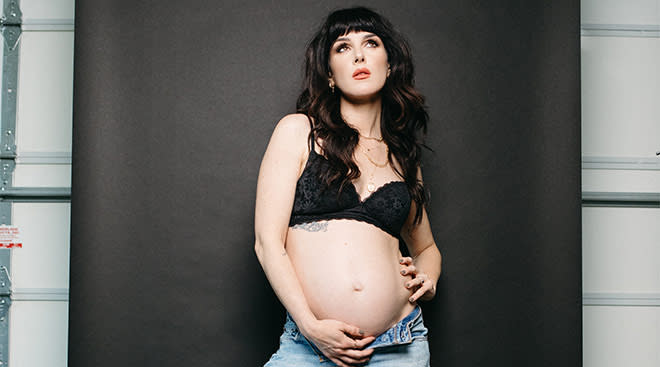On the Frontlines of the Fight for Black Maternal Health Equity
This article is part of The Bump’s Reclaiming Your Power series featuring changemakers who are dedicated to supporting and preserving Black maternal health. These doctors and thought-leaders share their insights and advice to help guide and empower women of color who are planning or navigating pregnancy.
Charles Johnson IV lost his wife, Kira, to this country’s maternal mortality crisis. After a routine c-section to deliver their second child, Kira bled internally for more than 10 hours before her medical team took action. Channeling his grief and outrage surrounding the tragedy and the similar tragic stories of too many families of color, Johnson founded 4Kira4Moms, a nonprofit organization dedicated to combating maternal mortality. He has been on the frontlines of the legislative fight to support and protect the health of mothers during and after pregnancy, and to eliminate disparities in maternal care and outcomes. Below, Johnson offers a glimpse of the future he’s working to secure for Black mothers, and advice on how women of color can feel empowered and supported during their pregnancy.
The Bump: Tell us more about the work you’re doing to support Black maternal health.
Charles Johnson: Since losing my wife Kira, I have dedicated my life toward putting an end to the maternal mortality health crisis. Black women are disproportionately affected by this epidemic, as they are three times more likely to die from pregnancy than white women. Implicit bias, access to healthcare and a number of other factors highlight the need for legislation, support for community-based organizations focused on Black maternal health, and access to care, information and resources for all underserved and disproportionately affected communities.
TB: What would you like to see happen in the near future that will significantly improve outcomes for Black mothers?
CJ: First, I’d like to see Congress fully fund and pass the Black Maternal Health Momnibus Act, a package of 12 separate bills addressing maternal mortality. Included in this package of legislation are significant measures that will address some of the systemic issues, like mandatory implicit bias training for hospitals. The Kira Johnson Act, named after my wife Kira, will award funding to community-based organizations working to promote Black maternal health equity, provide funding to implement trainings on bias and racism for all employees in maternity care settings, and establish respectful Maternity Care Compliance Programs to promote accountability in hospitals and in birth settings. These accountability measures will require that hospitals provide physical space in their facilities for federal oversight to monitor and champion on behalf of all mothers. Overall, the Momnibus legislation will address the issue as a whole and help us to continue addressing specific issues on behalf of Black women.
Next, I’d like to see Medicaid coverage permanently expanded from six months to 12 months to ensure that mothers and their babies are provided for during critical stages postpartum. Additionally, access to donor breast milk would help provide nutrients to babies in need while also curing preventable illness in newborns. Lastly, access to untraditional care providers like doulas and midwives should be provided for in Medicaid coverage as well to close the gap on care accessibility for those in hospital and healthcare deserts.
TB: Have there been any recent milestones achieved that offer hope that we’re headed in the right direction?
CJ: Yes! President Biden recently signed into law the first bill in the historic Momnibus legislation. The Protecting Moms Who Served Act is an historic investment to address the unique risk factors facing veterans during and after their pregnancies. I will continue to champion all of the remaining bills.
TB: Black pregnant women face an increased risk for a number of medical conditions and complications, including maternal death, and many are feeling stressed and powerless. How can Black moms-to-be reclaim a sense of empowerment during their pregnancy?
CJ: Black women are powerful beings. Women of color are resilient, tenacious fighters who also deserve to be fought for. They deserve to be heard. They deserve fair, equitable and honorable treatment in healthcare settings. I’ve heard countless stories about how Black women are now afraid of having children—and that should not be the case. This epidemic has robbed us of growing Black families. We’re fighting to help eradicate those things that infringe upon the right to equitable care and safe birthing experiences.
I encourage Black women to create a birthing plan and invite nontraditional health workers like midwives and doulas into their plans. Through 4Kira4Moms, we’re also arming women with a “Mommy Bill of Rights” of sorts and educating them so that they, and their birthing team, are aware of their rights should their birth experience require someone to step in and advocate on their behalf.
TB: What do you think Black moms-to-be need to hear most right now?
CJ: We hear you! Your words, voice, feelings and experiences have not fallen on deaf ears. Continue to listen to your bodies. Have a birth plan in place and continue to prepare and pray for the best. Do not let the fear of childbirth prevent you from experiencing the joy of motherhood. Have an advocate with you in the room to speak on your behalf during your birthing process. We won’t stop until we eradicate maternal mortality in this nation and in our world. Black mothers matter.
For more conversations around Black maternal health, check out the Reclaiming Your Power interviews with Simmone Taitt, founder and CEO of Poppy Seed Health, and Kendra Segura, MD, an ob-gyn and star on Bravo’s Married to Medicine: Los Angeles. Visit The Bump’s Black Maternal Health Hub for more information, inspiration and support.
About the expert:
Charles Johnson IV has suffered an unimaginable tragedy that strikes too many families—and has made it his life’s mission to save others from the same fate. In April 2016 his healthy and full-of-life wife, Kira, gave birth to their second beautiful child. But Kira immediately began struggling in ways that the hospital staff could not explain, even as he watched and implored the staff that something was horribly wrong. Kira died within hours.
Johnson was understandably overcome by grief—grief that turned into outrage. He channeled his pain and his passion into founding a nonprofit, 4Kira4Moms, that is dedicated to changing systems to better prevent birth-related deaths. 4Kira4Moms advocates for improved maternal health policies and regulations; educates the public about the impact of maternal mortality in communities; provides peer support to victims’ family and friends; and promotes discussion of maternal mortality as a human rights issue.
Johnson has shared his story and advocated for change through countless live events and media appearances all over the country, including at the March for Moms rally in Washington, D.C… In September 2018 he testified before the U.S. House Energy and Commerce Subcommittee on Health about the need to pass the Preventing Maternal Deaths Act, which was subsequently passed by Congress and signed into law. He also testified before the Congressional Oversight Committee in support of the “Momnibus” Act, an unprecedented legislative package of 12 bills all focused on putting an end to the maternal death crisis, including the “Kira Johnson Act” in honor of his late wife.
Please note: The Bump and the materials and information it contains are not intended to, and do not constitute, medical or other health advice or diagnosis and should not be used as such. You should always consult with a qualified physician or health professional about your specific circumstances.
Navigate forward to interact with the calendar and select a date. Press the question mark key to get the keyboard shortcuts for changing dates.





















































